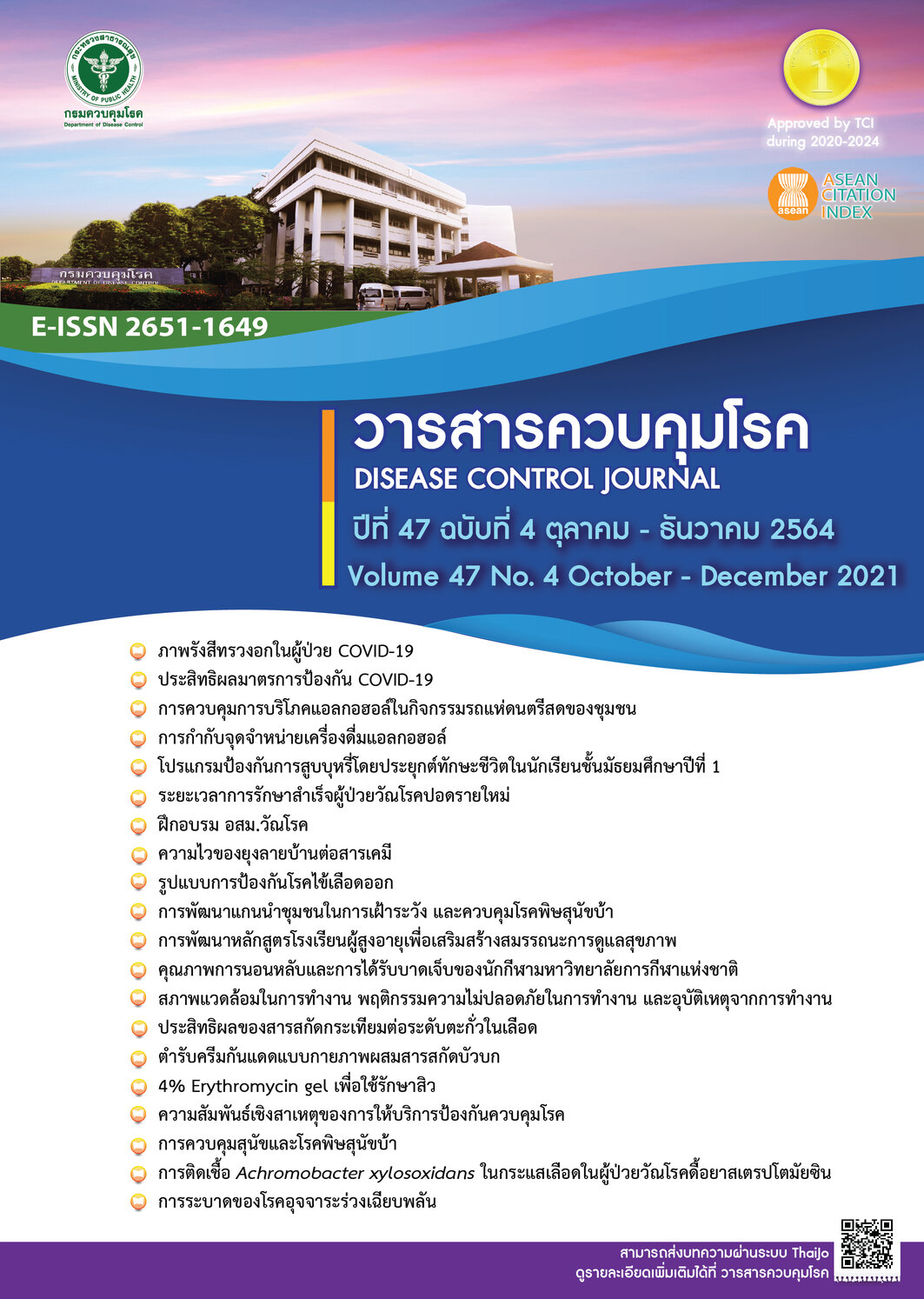Development of self-care competency enhancement course in the elderly school for prevention of dependency among the elderly
DOI:
https://doi.org/10.14456/dcj.2021.87Keywords:
competency enhancement, self-care, quality of Life, elderly schoolAbstract
The objective of this research is to develop a course of the elderly school to enhance self-care competency for prevention of dependency among the elderly and compare their health behaviors and quality of life (QOL). The target group was a total of 52 elderly people in the Samrit Wittaya Elderly School, which is located in Phimai District, Nakhon Ratchasima Province. Data were collected using a questionnaire and a focus group discussion. The study duration was 12 months. Descriptive statistics was used for the quantitative analysis and paired t-test used for the mean comparisons. The qualitative data were analyzed using a content analysis method. The results were as follows: 1) the study has created the course for the elderly competency enhancement in self-care activities for preventing dependency among the elderly based on the Four-Es Principle (Emotion, Eating, Exercise, and Elimination) of self-care or Ya Paad Kha Nan (in Thai). The course consists of 10 units within 198 study hours; 2) Results of utilizing the course by assessing self-care behaviors and QOL of the elderly following the course participation, it was found that the elderly had a high level of self-care behaviors (3.52±0.89). Likewise, the QOL was also at a high level (4.47±0.54); and 3) After comparison of the two outcomes after the course completion, it was found that the elderly had significantly higher mean scores of self-care behavior and QOL when compared with those before participation in the course (Mean difference: 1.36, 95%CI: 0.93, 1.78, p<0.001 and Mean difference: 1.69, 95%CI: 1.48, 1.89, p<0.001, respectively). This research shows that the course developed has high efficiency and can be useful for building an individual psychomotor skill and QOL of the elderly on self-care, as well as leading to a reduction in dependency condition among the elderly.
Downloads
References
Laksananant T, Itthidechpong S. Aging self care. Nonthaburi: Department of Health; 2015. (in Thai)
Prasatkul P. Situation the Thai elderly 2015. Bangkok: Foundation of Thai Gerontology Research and Development Institute; 2016. (in Thai)
National Statistical Office. Report on the 2017 survey of the older person in Thailand. Bangkok: Statistical Forecasting Division, National Statistical Office; 2018. (in Thai)
Ministry of Public Health (TH). Annual report 2017. Division of non-communicable disease, Department of disease control. Nonthaburi: Division of non-communicable disease; 2017. (in Thai)
Nakhon Ratchasima Health Provincial Office (TH). Data from ADL screening 2016 [Inter-net]. Nakhon Ratchasima [cited 2018 Jun 24]. Available from: http://www.korathealth.com/ korathealth/download/
Thailand Information Center (TH). Phimai Demographic Information, Nakhon Ratchasima Province [Internet]. Nakhon Ratchasima [cited 2018 Jun 24]. Available from: http://nakhon-ratchasima.kapook.com/%E0%B8%9E%E0%B 8%B4%E0%B8%A1%E0%B8%B2%E0%B8 %A2.
Ban Sum Health Promoting Hospital. Population data report form. Nakhon Ratchasima: Ban Sum Health Promoting Hospital; 2017. (in Thai)
Pinthong J. Reform of the system to support the aging society of Bangkok. Thai Population Association. Bangkok: Thai Health Promotion Foundation; 2015.
Thanathiti T, Chamroonsawat K. Development of optimal self-care behavior of seniors in a Se¬nior Club, Bangtoey sub-district, Sampran dis¬trict, Nakhon Pathom province. Sonklanakarind journal of nursing. 2015;35(3):57-70.
Rogers RW. A protection motivation theory of fear appeals and attitude change. Journal of Psychology. 1986;91(1):93-114.
Bandura A. Self-efficacy: Toward a unifying theory of behavioral change. Psychological Review. 1997;84(2):191-215.
Woraphongsathorn S. Research in health education. Bangkok: Ramkhamhaeng University; 2016. (in Thai)
Singsalasang A, Salawongluk T, Satayavongthip B, Nguanjairak R, Phungphet S. Quality of life among the elderly who participated in activities in the elderly school. Proceeding of the 11th National Academic Conference and Presentation of Local Research (Connecting Local Research to International Perspectives); 2019 Aug 6-7; 1015
Nakhon Ratchasima, Thailand. Nakhon Ratcha-sima Rajabhat University; 2019.
Kemmis S, Mc Taggart C. The action research planner. 3rd ed. Deakin University: Victoria; 1998.
Best, John W. Research in education. 3rd ed. Prentice Hall Inc: New Jersey; 1981.
Salawongluk T. Development of training courses for enhancing health competencies for teachers of the health team Nakhon Ratchasima Province. [Thesis]. Nakhon Ratchasima: Vongchavalitkul University; 2010. 189 p. (in Thai)
Rothwell. The Action Learning Guidebook. Josssey - Bass/Pfeifer: California; 1999.
Sombateyotha K, Yoosuk W, Turnbol N. Health Behavior and Quality of Life of the Elderly in Chiangyuen District, Mahasarakham Province. J Sci Technol MSU. 2019;38(1):47-59. (in Thai)
Downloads
Published
How to Cite
Issue
Section
License
Articles published in the Disease Control Journal are considered as academic work, research or analysis of the personal opinion of the authors, not the opinion of the Thailand Department of Disease Control or editorial team. The authors must be responsible for their articles.






